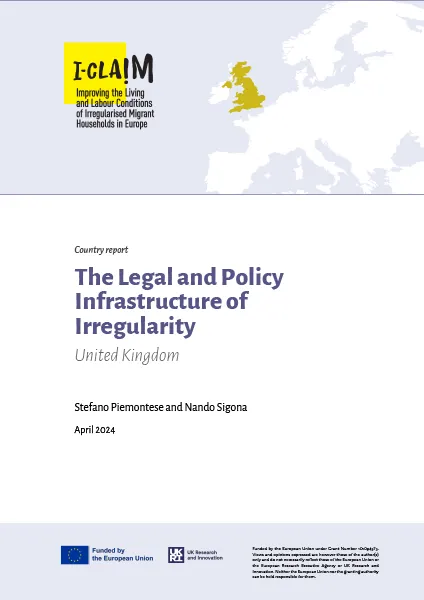The Legal and Policy Infrastructure of Irregularity: United Kingdom
Stefano Piemontese and Nando Sigona
How to cite:
Piemontese, S. and Sigona, N. (2024) The legal and policy infrastructure of irregularity: United Kingdom. I-CLAIM. DOI: https://zenodo.org/records/10977054
The Legal and Policy Infrastructure of Irregularity: United Kingdom
Stefano Piemontese and Nando Sigona
This report examines the legal and policy infrastructures of irregular migration in the United Kingdom (UK). It investigates the intersection between immigration, labour and welfare regimes and how they contribute to the irregularisation of migrants and determine their living and working conditions.
The analysis of legal and policy frameworks in the UK is informed by the concept of irregularity assemblage, whereby irregularity is understood as produced by policies, practices and narratives occurring in different fields and sites and across different levels of governance and policy domains. This approach not only enables us to move away from essentialising understandings of irregular migration as a clear-cut phenomenon, and irregularity as an intrinsic and fixed characteristic of some individuals on the move, but also to account for a wider range of factors that come into play in the production of the condition of irregularity at a particular time and place. We argue that irregularity is produced at the nexus of different regulatory frameworks and embedded in specific labour market and welfare regimes, and unevenly impacts individuals depending on their national origin, gender, class and belonging to racialised communities.
The EU enlargement in the 2000s marked a significant transformation in the population of irregular migrants in the UK. It also highlighted the impact of changing regulatory frameworks in making and unmaking some migrants as ‘irregular’ and viceversa, as in the case of the transition of central and eastern Europeans from Third Country Nationals subject to immigration control into EU citizens. The policy measures introduced by the UK government since the early 2010s to create a hostile environment for irregular migrants define the contours within which irregular migrants enter and settle in the UK. Brexit and the end of freedom of movement for EU citizens has dramatically transformed the socio-demographic profile of the new migrant population into the UK and produced new forms of irregularisation for migrants. The New Plan for Immigration launched in the early 2020s captures the changing politics of migration and connects it to the new ideological project of ‘Global Britain’. Over the last few years, rising anti-immigrant hostility and the fight against irregular immigration in the UK, particularly around so called ‘small boat crossings’ has come to shape the overall narrative on migration. The criminalisation of asylum has gained traction in this period and is a pillar of the 2023 Illegal Migration Act. The emerging post-Brexit immigration regime takes the Australian Point-based System as a reference point but has some significant differences which make it more employer-led. The sponsorship system that underpins the immigration system creates structural conditions that can lead to the exploitation of migrant workers.
This report identifies the co-option of private and public actors into the role of immigration control as a key feature of the hostile environment. This form of everyday bordering further confines and restricts the lives of irregular migrants, pushing them further under the radar and making them vulnerable to exploitation and abuses, particularly in the absence of safe reporting pathways. The precarisation of status and the intensification of the bureaucratic checks and requirements associated with visas contribute to a further irregularisation of migration and migrants, making the transition from regular to irregular status easier. Finally, we argue that immigration controls also impact on the labour market and working conditions available to individuals with no or precarious legal status. Moreover, the increased role of the platform economy is creating new opportunities and vulnerabilities for irregular migrants.
The report is part of the Horizon Europe and UKRI-funded Improving the Living and Labour Conditions of Irregularised Migrant Households in Europe (I-CLAIM) project. The main objective of I-CLAIM is to understand the various forms of irregularity experienced by migrant workers and their families and the factors that determine and amplify them. The research is carried out in six European countries (Finland, Poland, Italy, Germany, the Netherlands and the UK) and at the EU level.
